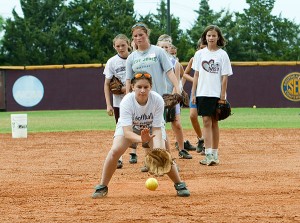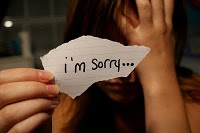A genuine apology seems a rarity these days. There’s plenty of poor behavior and opportunities for apologies, but few seem to come. A middle school girls’ softball practice a few years ago provided a lesson in apology I won’t forget. I was one of two dads willing to help out as assistant coaches. While putting the girls through basic infield practice one afternoon, the other assistant did not like the performance of his daughter and one of the other players. They weren’t hustling and were making careless mistakes. First he yelled encouragement. “Come on, let’s have some hustle…” Then he yelled instruction, “You gotta keep your eye on the ball…” Then he lost it. He yelled at them, berating their efforts and their skills.
 After a few moments, the coach intervened and the assistant stormed off to the sideline. When the dust settled and practice came to a close, the coach approached the assistant. The assistant mumbled an apology about “losing it.” The coach then said quietly and firmly, “I’m not the one who needs the apology. I think you need to apologize to the girls and ask for their forgiveness.”
After a few moments, the coach intervened and the assistant stormed off to the sideline. When the dust settled and practice came to a close, the coach approached the assistant. The assistant mumbled an apology about “losing it.” The coach then said quietly and firmly, “I’m not the one who needs the apology. I think you need to apologize to the girls and ask for their forgiveness.”
The assistant would not have been more stunned if the coach had hit him with a board. “Huh-uh” he huffed and walked off.
To his credit, at the beginning of the next practice, the assistant addressed the team just before they took the field. “I lost my temper last week. I shouldn’t have done it. I’m sorry. Will you forgive me?”
They, of course, as a group said, “Sure.” They then went to their respective places in the field with all the seriousness and silliness of 15 year-olds.
Kobe Bryant, superstar basketball player, made an obscene gay slur to a ref, and then got by with apologizing “to whoever might have been offended.” Marilyn Davenport, an Orange County political official sent out an email with a cartoon of Obama’s face superimposed over a chimp’s body. Her written apology started, “I’m sorry if my email offended anyone.” She then blamed those who forwarded her email and those who made it a racial issue, making “much ado about nothing.”
With just these two recent examples, public apologies are no longer a matter of taking responsibility for doing or saying something offensive, but rather blaming people for being offended.
What’s missing is some acknowledgment by the person who said or did the offending thing that they actually did something ill advised, wrong, or simply stupid. Not intending to offend someone is not the same as not offending them. When someone has perpetrated an offense, intended or not, standing up and taking responsibility for it is the action that comes next. Period.
 How much more of a role model Kobe would be if he could have said, “I lost my temper. I said something stupid. I said something that was offensive to a whole group of people who don’t deserve that. That’s not the kind of person I want to be.”
How much more of a role model Kobe would be if he could have said, “I lost my temper. I said something stupid. I said something that was offensive to a whole group of people who don’t deserve that. That’s not the kind of person I want to be.”
How much more forgivable it would have been if the state official had said, “I was going for a cheap laugh, but I didn’t stop and think that it was mean and racist. I was stupid and insensitive to degrade someone in that way. I have a lot to learn.”
I’m sure some readers will simply conclude that I’m trying to simply be socially and politically correct. That’s OK. But it’s important to realize that each of use has at least two sets of values at work, our conscious values and our unconscious values. These two sets of values guide our moral choices and actions. The conscious values are the ones we can talk about. They underlie our stated beliefs and our willful actions. But then, once in awhile, our unconscious values that we are not particularly proud of blurt something out or do something we can hardly believe. Those unconscious values lurk around reminding us in weak moments that we are all still far more fearful and hateful of those we don’t understand than we’d like to admit.
Until we come to terms with our unconscious values and are willing to apologize for our offenses, we are going to stay stuck as individuals and as a society.
0 Comments until now
Add your Comment!